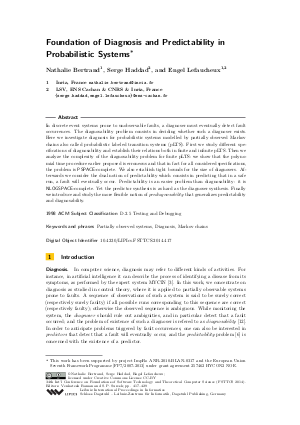Foundation of Diagnosis and Predictability in Probabilistic Systems
Authors Nathalie Bertrand, Serge Haddad, Engel Lefaucheux
-
Part of:
Volume:
34th International Conference on Foundation of Software Technology and Theoretical Computer Science (FSTTCS 2014)
Part of: Series: Leibniz International Proceedings in Informatics (LIPIcs)
Part of: Conference: IARCS Annual Conference on Foundations of Software Technology and Theoretical Computer Science (FSTTCS) - License:
 Creative Commons Attribution 3.0 Unported license
Creative Commons Attribution 3.0 Unported license
- Publication Date: 2014-12-12
File

PDF
LIPIcs.FSTTCS.2014.417.pdf
- Filesize: 0.49 MB
- 13 pages
Document Identifiers
Subject Classification
Keywords
- Partially observed systems
- Diagnosis
- Markov chains
Metrics
- Access Statistics
-
Total Accesses (updated on a weekly basis)
0PDF Downloads0Metadata Views
Abstract
In discrete event systems prone to unobservable faults, a diagnoser must eventually detect fault occurrences. The diagnosability problem consists in deciding whether such a diagnoser exists. Here we investigate diagnosis for probabilistic systems modelled by partially observed Markov chains also called probabilistic labeled transition systems (pLTS). First we study different specifications of diagnosability and establish their relations both in finite and infinite pLTS. Then we analyze the complexity of the diagnosability problem for finite pLTS: we show that the polynomial time procedure earlier proposed is erroneous and that in fact for all considered specifications, the problem is PSPACE-complete. We also establish tight bounds for the size of diagnosers. Afterwards we consider the dual notion of predictability which consists in predicting that in a safe run, a fault will eventually occur. Predictability is an easier problem than diagnosability: it is NLOGSPACE-complete. Yet the predictor synthesis is as hard as the diagnoser synthesis. Finally we introduce and study the more flexible notion of prediagnosability that generalizes predictability and diagnosability.
Cite As Get BibTex
Nathalie Bertrand, Serge Haddad, and Engel Lefaucheux. Foundation of Diagnosis and Predictability in Probabilistic Systems. In 34th International Conference on Foundation of Software Technology and Theoretical Computer Science (FSTTCS 2014). Leibniz International Proceedings in Informatics (LIPIcs), Volume 29, pp. 417-429, Schloss Dagstuhl – Leibniz-Zentrum für Informatik (2014)
https://doi.org/10.4230/LIPIcs.FSTTCS.2014.417
BibTex
@InProceedings{bertrand_et_al:LIPIcs.FSTTCS.2014.417,
author = {Bertrand, Nathalie and Haddad, Serge and Lefaucheux, Engel},
title = {{Foundation of Diagnosis and Predictability in Probabilistic Systems}},
booktitle = {34th International Conference on Foundation of Software Technology and Theoretical Computer Science (FSTTCS 2014)},
pages = {417--429},
series = {Leibniz International Proceedings in Informatics (LIPIcs)},
ISBN = {978-3-939897-77-4},
ISSN = {1868-8969},
year = {2014},
volume = {29},
editor = {Raman, Venkatesh and Suresh, S. P.},
publisher = {Schloss Dagstuhl -- Leibniz-Zentrum f{\"u}r Informatik},
address = {Dagstuhl, Germany},
URL = {https://drops.dagstuhl.de/entities/document/10.4230/LIPIcs.FSTTCS.2014.417},
URN = {urn:nbn:de:0030-drops-48605},
doi = {10.4230/LIPIcs.FSTTCS.2014.417},
annote = {Keywords: Partially observed systems, Diagnosis, Markov chains}
}
Author Details
References
-
N. Bertrand, E. Fabre, S. Haar, S. Haddad, and L. Hélouët. Active diagnosis for probabilistic systems. In Proceedings of FoSSaCS'14, volume 8412 of Lecture Notes in Computer Science, pages 29-42. Springer, 2014.

- N. Bertrand, S. Haddad, and E. Lefaucheux. Foundation of diagnosis and predictability in probabilistic systems. Research Report LSV-14-09, ENS Cachan, June 2014. Available at URL: http://www.lsv.ens-cachan.fr/Publis/RAPPORTS_LSV/PDF/rr-lsv-2014-09.pdf.
-
B. G. Buchanan and E. H. Shortliffe. Rule Based Expert Systems: The MYCIN Experiments of the Stanford Heuristic Programming Project. Addison-Wesley, 1984.

-
J. Chen and R. Kumar. Polynomial test for stochastic diagnosability of discrete-event systems. IEEE Transactions on Automation Science and Engineering, 10(4):969-979, 2013.

-
J. Chen and R. Kumar. Failure prognosability of stochastic discrete event systems. In Proceedings of ACC'14, pages 2041-2046. IEEE, 2014.

-
S. Genc and S. Lafortune. Predictability of event occurrences in partially-observed discrete-event systems. Automatica, 45(2):301-311, 2009.

-
S. Haar, S. Haddad, T. Melliti, and S. Schwoon. Optimal constructions for active diagnosis. In Proceedings of FSTTCS'13, volume 24 of LIPIcs, pages 527-539. Schloss Dagstuhl - Leibniz-Zentrum fuer Informatik, 2013.

-
S. Jiang, Z. Huang, V. Chandra, and R. Kumar. A polynomial algorithm for testing diagnosability of discrete-event systems. IEEE Transactions on Automatic Control, 46(8):1318-1321, 2001.

-
A. R. Meyer and L. J. Stockmeyer. The equivalence problem for regular expressions with squaring requires exponential space. In Proceedings of SWAT'72, pages 125-129. IEEE Computer Society, 1972.

-
N. Rampersad, J. Shallit, and Z. Xu. The computational complexity of universality problems for prefixes, suffixes, factors, and subwords of regular languages. Fundamenta Informaticae, 116(1-4):223-236, 2012.

-
M. Sampath, S. Lafortune, and D. Teneketzis. Active diagnosis of discrete-event systems. IEEE Transactions on Automatic Control, 43(7):908-929, 1998.

-
M. Sampath, R. Sengupta, S. Lafortune, K. Sinnamohideen, and D. Teneketzis. Diagnosability of discrete-event systems. IEEE Transactions on Automatic Control, 40(9):1555-1575, 1995.

-
D. Thorsley and D. Teneketzis. Diagnosability of stochastic discrete-event systems. IEEE Transactions on Automatic Control, 50(4):476-492, 2005.

